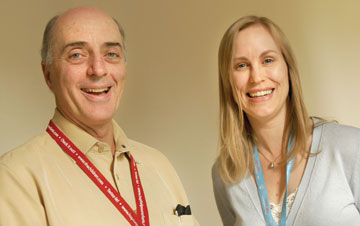ADHD Clinic helps children and their parents manage elusive neurobiological disorder

Dr. Emmett Francoeur, director of The Children's Child Development Program, and Jodi Paterson, coordinator of the The Children's ADHD Clinic, both agree that while diagnosis of the neurobiological disorder ADHD is difficult, it is essential.
It's an elusive, even controversial disorder that is hard to diagnose and even harder to treat. Some critics even wonder if it exists at all. It does. Attention Deficit Hyperactivity Disorder (ADHD) is a complex mental condition with very real, very damaging consequences if not treated, according to Dr. Emmett Francoeur of The Montreal Children's Hospital of the MUHC.
"ADHD is a neurobiological disorder which affects about six per cent of children," says Francoeur, director of The Children's Child Development Program. "It is most often diagnosed in youngsters aged 6 to 12. These children have difficulty attending and focusing. They are hyperactive and therefore they don't do well in school, with friends or even at home." The disorder is hard to diagnose, because its symptoms - hyperactivity for example, or inability to focus on repetitive tasks - are very common in children. "A lot of normal behaviours in this age group look like ADHD," says Francoeur. "The difference is the severity of the behaviour and its impact on the child's life. We see a lot of active, curious kids in the 6 to 12 bracket - but those kids succeed in school, they have friends, they are happy, they get along with their family."
"Kids with ADHD don't do these things very well," adds Jodi Paterson, coordinator of the ADHD Clinic. They don't really have the ability to self regulate and monitor their behaviour and what they say. When parents or teachers see out-of-control behaviour, they should be wondering if the problem might be ADHD." No single test or battery of tests can confirm the presence of ADHD. "First, we have to take into account what teachers and parents observe about the child," says Francoeur. "Then, we do a psychological evaluation, usually including an IQ test, and we assess the child's academic ability. In addition, we administer psychological questionnaires such as the Conners Scale. Finally, we put all the results together and try to determine if the child meets the criteria of ADHD as set out in the Diagnostic and Statistical Manual of Mental Disorders. In particular, we need to establish whether the child is impaired at home, at school and with friends."
While diagnosis is difficult, it is essential. Children with untreated ADHD tend to do poorly in school and to lack social skills. As a result, they feel badly about themselves, and may become anxious or even depressed. As adults, if they haven't learned techniques to deal with their disorder, they tend to be accident prone, and may have difficulty holding jobs or maintaining long-term relationships.
"The disorder has a biological basis, and it is treatable," says Francoeur. "Medications can be quite effective. The main category is stimulants, which work on specific areas of the brain to produce better control and regulation of behaviour. Cognitive therapy is also important."
Founded in 2005, the ADHD Clinic at the Children's serves children with complex, treatment-resistant cases of ADHD - those who need more help than family doctors or schools can give. At the Clinic, children are evaluated by a team of psychologists, pediatricians and nurses, and are referred to the appropriate specialists in Neurology, Psychiatry, and Developmental Pediatrics if necessary.
Parents of children with ADHD may also need training and counselling. "Parents often have a hard time accepting their child has ADHD," explains Paterson. "And even when they do, there's the practical, day-to-day chore of helping children who have a hard time organizing themselves and putting things together. Mothers and fathers need to learn all sorts of techniques to cope with this situation. Of course, they can turn to community organizations such as the Learning Disabilities Association of Quebec, as well as to private counsellors and tutors - but we're there to help them as well."
What's a parent to do?
Are you concerned your child may have ADHD? If so, you need to find out-and it may not be easy.
| <# Image("dec2006_ADHD2.jpg"); #> |
"Diagnosis can be tricky and time consuming," says Jodi Paterson, coordinator of the ADHD Clinic at The Montreal Children's Hospital. "Contrary to what some parents have been told, there is no single test that can identify a child with ADHD. Several different psychological tests may be needed. We also take into account the child's behaviour and academic performance, and the observation of teachers and parents. Putting all these things together, we arrive at a diagnosis."
Being a parent of a child with ADHD can pose some very real challenges, starting with acceptance. "It can be difficult to believe that your child has a neurobiological disorder, and especially one with vague symptoms and no simple way to diagnose," says Paterson.
Treatment usually includes medication and counselling or cognitive therapy. Parents play a vital role in keeping children with ADHD on track with treatment and helping them get - and stay - organized.
"Mothers and fathers need to learn effective strategies to help," says Paterson. "The good news - help and support for parents is readily available. They can turn to community organizations such as The Learning Disabilities Association of Quebec, or work with private counsellors and coaches. And, of course, they can talk to us."
